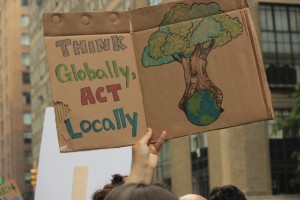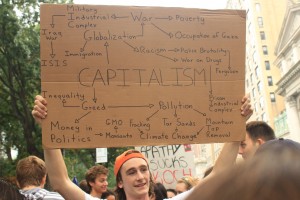By DANIELLE CORCIONE
Updated: Sunday, September 28th at 10:19 p.m.
The nature of social movements is changing.
 Climate Week involved more corporations than any other social protest in recent history. These series of events, during the week of Sept. 22, in New York City, including the much-anticipated People’s Climate March and the not-so-anticipated Flood Wall Street protest, were organized to raise awareness about the importance of global sustainability. According to Politico, the People’s Climate March alone drew 400,000 participants and became the largest climate-related protest in history on Sunday.
Climate Week involved more corporations than any other social protest in recent history. These series of events, during the week of Sept. 22, in New York City, including the much-anticipated People’s Climate March and the not-so-anticipated Flood Wall Street protest, were organized to raise awareness about the importance of global sustainability. According to Politico, the People’s Climate March alone drew 400,000 participants and became the largest climate-related protest in history on Sunday.
While the Climate Week is not the first of its kind, it differs from previous actions against climate change. For instance, in 2009, several campers internationally rallied against major carbon emissions under the Camp for Climate Action campaign, without the support of a corporation.
Unlike staunch environmentalists involved in the Camp for Climate Action, the march did not begin as a grassroots movement. Over 1,500 other like-minded organizations, including the Sierra Club, 350.org and Food and Water Watch, rallied national support for the People’s Climate March alone. Larger global partners – including Swiss Re, Lockheed Martin, and the Climate Group – planned and funded several of the events throughout the week.
There now lies a predictable relationship between Climate Week and Occupy Wall Street. The anti-Wall Street movement – fueled by a unique combination of socialism, communism, and anarchy to address progressive issues, such as sustainability – conveniently intersects with a week of events funded by corporations. Plus, both movements mobilized participants through popular social networks.
“I heard about [the People’s Climate March] through a friend that volunteered through 350, weeks in advance,” explains Ryan Ritter, a senior at Ramapo College. “My friend was apart of the Occupy Movement. The Occupy Movement had a good hand in promoting [the People’s Climate March] to get people to come through social media.”
Following the march, environmental activists gathered again in the Financial District in Lower Manhattan for Flood Wall Street. With the catchphrase “End Capitalism. End the Climate Crisis,” the progressive overtone of #FloodWallStreet especially relays the energy of the Occupy Wall Street movement; some even consider this protest as the revival of a movement that began three years ago. Demonstrators dressed in blue and blocked traffic on Broadway. Although there were significantly fewer demonstrators involved with Monday’s protests, the New York Daily reported 102 arrests. Although there was a buzz on social media prior to, during, and after Flood Wall Street, it was not nearly as publicized as the People’s Climate March.
“It’s interesting how little media coverage [Flood Wall Street] received leading up to the march on Sunday, considering the Flood Wall Street arrests drew so much attention immediately after the event,” Dylan Sprayberry, a senior at Ramapo College of New Jersey, explains. “[Both events] still ended up as essentially a grassroots hodgepodge of people relatively interested in the same goal but not necessarily with the same intentions as far as activism goes.”
While many demonstrators thrived off anti-capitalist chants and picket signs, they also participate in an event organized by monster corporations. Although these NGOs strive themselves with sustainable business practices, many participants’ outlook on the dichotomy of sustainability and big business contradict the involvement of as for-profit industries. There appears to be massive cognitive dissonance; the role of anti-capitalism within these demonstrations undoubtedly contradicts the processes in which they were organized.
Blogger and Occupy activist, Arun Gupta, criticizes the People’s Climate March as a massive PR campaign: “I’ve never been to a protest march that advertised in the New York City subway. That spent $220,000 on posters inviting Wall Street bankers to join a march to save the planet, according to one source.”
Should it take subway posters to get people involved? Are they, too, considered “activists”?
“Sometimes, it takes the simplest efforts to get people involved. Some don’t want to be die-hard activist, but they feel satisfied with minimal effort,” Halle Pineiro, a junior at Ramapo College of New Jersey, “It’s important to have supporters even if they don’t dedicate their whole lives to the cause.”
Social consciousness of global politics, especially around the environment, is the first step to enact change. After all, a movement begins simply with creating awareness. But is awareness alone enough to make an impact?
Similarly to other environmental protests, Climate Week emerged as a response to a large meeting between international political representatives. On Sept. 23rd, over 100 world leaders in the United Nations met for the 2014 Climate Summit in New York City. President Obama took many Americans’ deep concern for the environment into account, but was it enough?
There’s a new definition of activism in the 21st century. The levels of activism vary from social consciousness to apparently, getting arrested. If future protests follow the model of the Climate Week, grassroots organizing happens only after the mediation of business. The dawning of the post-millennium social movements will favor not the public, but moreover, the interests of corporations.
Photos by Halle Pineiro, Junior at Ramapo College of New Jersey



Overall, this was a very good article that informed the reader about the events surrounding the Climate Change Protest and then questioned exactly what it means to be active in a protest towards the end of the article. You had several good quotes from students, but it was unclear whether they attended the protests or not. I would also have moved one of the quotes higher in the story since there were no quotes until the fifth paragraph. I also would have liked to see you tie in the internet more to this story to go with our class theme.